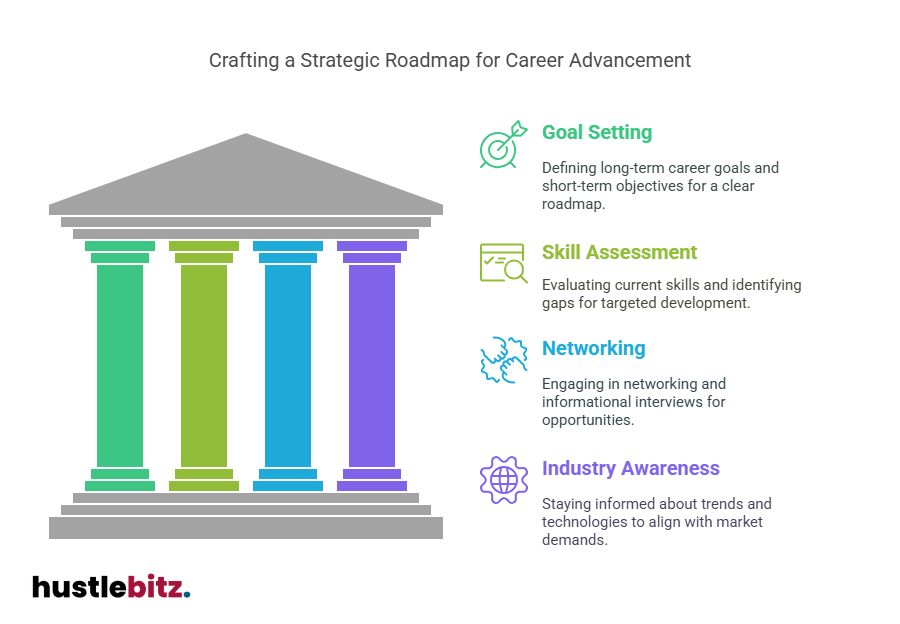A well-defined career strategy is essential for mapping your path to professional success. Start by setting clear career goals, both long-term and short-term, which will serve as your roadmap. Assess your current skills to identify gaps and areas for improvement. Network to uncover potential opportunities and stay informed about industry trends that may affect your career. Create an actionable plan with specific steps and deadlines, while also seeking constructive feedback and mentorship. This holistic approach prepares you to adapt and thrive in a dynamic job market, paving the way for greater achievement in your career. More insights await you ahead.
Key Takeaways
- Clearly define long-term career goals and short-term objectives to create an actionable roadmap for professional growth.
- Regularly assess current skills and conduct a skill gap analysis to identify areas for improvement and development.
- Actively network and engage in informational interviews to uncover potential job opportunities and industry insights.
- Stay informed about industry trends and emerging technologies to align career decisions with market demands and opportunities.
- Create a structured action plan with specific tasks, timelines, and accountability measures to achieve career aspirations.

Define Your Career Goals
To effectively navigate your career path, it is essential to clearly define your career goals, as they serve as a roadmap guiding your professional development and decisions.
Establishing a long-term vision allows you to identify where you want to be in the coming years, while short-term objectives break this vision into manageable, actionable steps. Consider your personal values and how they align with your professional aspirations, ensuring that your career trajectory reflects what is genuinely important to you.
A successful career strategy encompasses skill alignment, where you assess your current abilities and identify areas for growth that resonate with your ambitions.
Passion projects can be an effective way to explore interests outside conventional roles, providing opportunities for creativity and innovation. Additionally, maintaining a focus on work-life balance is crucial; integrating your career goals with your personal life fosters overall well-being and satisfaction.
To measure progress, establish success metrics that allow you to evaluate your achievements against your goals.
Networking strategies also play a vital role in career advancement, as building relationships within your industry can open doors to new opportunities and insights.
As you reach various life milestones, periodically reassess your career goals to ensure they remain relevant and aligned with your evolving aspirations.
Assess Your Current Skills

Evaluating your current skills is a crucial step in developing a successful career strategy, as it helps identify strengths and areas for improvement that align with your professional goals.
Employing self-assessment techniques, such as reflective journaling or feedback from peers, can provide valuable insights into your capabilities. Conducting a skill gap analysis allows you to compare your existing skills with those required for your desired roles, highlighting transferable skills that can be leveraged in various contexts.
To enhance your professional development, consider utilizing online courses that focus on skill enhancement and continuous learning. This proactive approach not only fills any identified gaps but also strengthens your personal branding as a committed learner. Additionally, maintaining a strengths inventory can serve as a powerful tool for articulating your value to potential employers and during networking strategies.
Moreover, establishing performance metrics to track your progress is essential. Regularly assessing your achievements against these metrics will ensure you remain on track towards your career objectives. Networking strategies can also provide opportunities to discuss your strengths and areas for growth with industry professionals, offering further insights into the skills that are highly valued in your field.
Ultimately, assessing your current skills is not just about identifying where you stand, but also about setting a clear path for your professional journey through informed decisions and continuous improvement.
Identify Potential Opportunities

Building on the foundation established by assessing your current skills, identifying potential opportunities involves actively exploring various career paths and roles that align with your strengths and aspirations. This exploration is critical to ensure that you are not only aware of available options but also prepared to seize them when they arise.
To effectively identify and pursue potential opportunities, consider the following strategies:
- Networking Events: Attend industry-specific networking events to meet professionals who can provide insights and guidance on potential career paths. Engaging with others in your field can significantly expand your understanding of available roles.
- Informational Interviews: Conduct informational interviews with individuals in roles you are interested in. This will offer first-hand perspectives on job responsibilities, required skills, and potential career trajectories.
- Skill Workshops and Volunteer Opportunities: Participate in skill workshops and seek out volunteer opportunities to build your experience and enhance your online portfolio. These activities not only enhance your skill set but also demonstrate your commitment to personal branding.
Research Industry Trends
Understanding industry trends is essential for making informed career decisions, as it allows professionals to align their skills and aspirations with the evolving demands of the job market. Conducting thorough market analysis helps identify key developments that shape the competitive landscape. This includes recognizing emerging technologies that are driving innovation trends and transforming traditional roles, thereby creating new opportunities and challenges.
One critical aspect to consider is workforce demographics. As the population ages and younger generations enter the job market, professionals must be aware of the shifting dynamics and the potential skill gaps that may arise. Industry forecasts can provide valuable insights into which sectors are experiencing growth and which may be contracting, enabling individuals to make strategic career choices.
The economic impact of various industries also plays a significant role in shaping career trajectories. Understanding how broader economic conditions influence job availability and required skills can guide professionals in their career planning.
Additionally, engaging in professional networking can provide firsthand knowledge of industry trends and best practices, allowing individuals to stay ahead of the curve.
Create an Action Plan

A well-structured action plan serves as a roadmap for achieving career goals, outlining specific steps and timelines to ensure focused progress. By creating an actionable framework, professionals can enhance their skill development and effectively track their milestones. This process involves identifying key action items, establishing a timeline, and allocating the necessary resources for each step.
To develop an effective action plan, consider the following:
- Action Items and Milestone Tracking: Break down your career goals into smaller, manageable tasks. This allows for easier tracking of progress and ensures that you remain focused on achieving each milestone. Regularly evaluate your performance against these milestones to maintain momentum.
- Timeline Establishment and Accountability Partners: Set realistic deadlines for each action item and share these with accountability partners. Collaborating with colleagues or mentors can provide motivation and support, making it easier to adhere to your timeline.
- Networking Strategies and Personal Branding: Identify opportunities for networking that align with your career aspirations. Establish a personal brand that reflects your unique skills and strengths, enabling you to connect with industry professionals effectively.
Incorporating risk assessment into your action plan is essential to mitigate potential challenges. Regularly evaluate your progress while being open to adjusting your plan as needed.
Seek Feedback and Mentorship

Incorporating feedback and mentorship into your career strategy can significantly enhance your professional development and decision-making process. The value of constructive criticism cannot be overstated; it allows you to identify areas for improvement and refine your skills. Employing effective feedback techniques such as peer feedback and feedback loops promotes a culture of continuous learning.
Mentorship offers numerous benefits that can accelerate your career progression. Establishing strong mentor relationships can provide you with insights that may not be accessible otherwise. A good mentor embodies essential qualities such as experience, empathy, and a genuine interest in your growth. Participating in mentorship programs can further solidify these relationships and expand your professional network, enhancing your networking strategies.
To effectively seek feedback and mentorship, consider the following framework:
| Action | Description | Outcome |
| Identify potential mentors | Look for individuals with experience in your field | Establish mentor relationships |
| Utilize feedback techniques | Implement peer feedback and constructive criticism | Improve skills and competencies |
| Engage in mentorship programs | Join structured programs for guidance | Increased knowledge and support |
| Set clear goals | Align your objectives with your mentor’s insights | Goal alignment for effective growth |
| Maintain communication | Regularly share progress and seek advice | Sustained feedback and development |
Adapt and Evolve Your Strategy

Continuously adapting and evolving your career strategy is essential for navigating the dynamic landscape of professional growth and opportunities. In an era characterized by rapid technological advancements and shifting market demands, adopting a flexibility mindset is paramount. This involves not only embracing change but also actively seeking out new avenues for development through continuous learning and skill diversification.
To effectively adapt your career strategy, consider the following:
- Self-Assessment Techniques: Regularly evaluate your skills, strengths, and areas for improvement. This process aids in identifying gaps in your knowledge and informs your learning path.
- Networking Strategies: Cultivating relationships within your industry can provide valuable insights and open doors to new opportunities. Engage in proactive problem solving with your network to address challenges collaboratively.
- Technology Integration: Embrace advancements in technology to enhance your personal branding and market adaptability. This includes leveraging digital tools for remote work and online learning, which can significantly broaden your skill set.
Final Thoughts
Creating a career strategy that maps your path to success requires a clear understanding of your goals, skills, and opportunities, as well as the ability to adapt in a dynamic job market. By defining your aspirations, regularly assessing your progress, and actively seeking opportunities for growth, you can stay ahead in your career journey. The key is to be proactive, stay informed about industry trends, and surround yourself with mentors and a strong network. With a well-structured plan and a commitment to ongoing development, you can confidently navigate your career and achieve lasting success.




